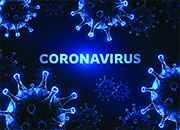NIH Launches Trial of Antibody Drugs Against COVID-19

TUESDAY, Oct. 13, 2020 (HealthDay News) -- A study to assess whether certain approved or experimental drugs are effective against COVID-19 and warrant testing in large clinical trials has been launched by the U.S. National Institutes of Health (NIH).
The research will largely focus on monoclonal antibody medications. These types of drugs garnered headlines last week as President Donald Trump credited one such drug cocktail, made by Regeneron, with helping him recover from his coronavirus infection.
However, the therapy is not yet approved against COVID-19 and is still considered experimental.
"The goal here is to identify as quickly as possible the experimental therapeutics that demonstrate the most clinical promise as COVID-19 treatments and move them into larger-scale testing," said Dr. Anthony Fauci, director of the National Institute of Allergy and Infectious Diseases (NIAID).
According to the NIH, the new phase 2 study will enroll adults hospitalized with COVID-19 at as many as 40 U.S sites and is being conducted by NIAID.
The study will assess the approved monoclonal antibody risankizumab in conjunction with the antiviral drug remdesivir, compared to a placebo plus remdesivir. It will also test the experimental monoclonal antibody lenzilumab with remdesivir, compared to placebo and remdesivir.
Remdesivir has shown benefits for patients with severe COVID-19 -- so severe they needed supplemental oxygen -- and is now considered standard of care for hospitalized COVID-19 patients, the NIH said.
Monoclonal antibodies are laboratory versions of proteins naturally produced by the immune system in response to invading viruses or other pathogens. Some are already approved for non-COVID uses: Risankizumab received U.S. Food and Drug Administration approval in 2019 for the treatment of severe plaque psoriasis.
Lenzilumab is currently being tested separately in a phase 3 COVID-19 study, and in a phase 1b/2 study as sequenced therapy along with CAR-T treatments.
About 100 volunteers will be assigned to each study arm, with each of the study sites testing no more than three treatments at once.
The new study "aims to streamline the pathway to finding urgently needed COVID-19 treatments," NIH Director Dr. Francis Collins explained in an NIH news release. That might be accomplished "by repurposing either licensed or late-stage-development medicines and testing them in a way that identifies the most promising agents for larger clinical studies in the most expedient way possible," he said.
According to Fauci, the new study's design "is both an efficient way of finding those promising treatments and eliminating those that are not."
More information
The U.S. Centers for Disease Control and Prevention has more on COVID-19.

The news stories provided in Health News and our Health-E News Newsletter are a service of the nationally syndicated HealthDay® news and information company. Stories refer to national trends and breaking health news, and are not necessarily indicative of or always supported by our facility and providers. This information is provided for informational and educational purposes only, and is not intended to be a substitute for medical advice, diagnosis, or treatment.

